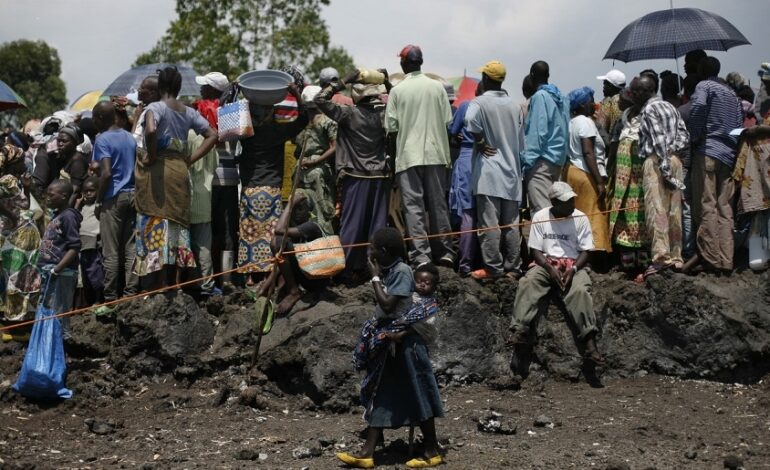M23 Rebels Accused Of Killing Civilians As Fighting Resumes In DR Congo
The killing of 50 civilians comes after five days of relative calm following a ceasefire ordered at a summit of regional leaders.

The Democratic Republic of Congo national army, FARDC, has accused the March 23 rebel movement of killing 50 civilians in a village in North Kivu.
The killing happened in Kishishe, located 70 kilometres from the provincial capital of Goma on Tuesday Nov 29, the army said.
M23 denied the accusations and called for an independent investigation into the massacre.
The killings come five days after relative calm was established following a “mini-summit” in Luanda on Nov 23. The ceasefire began Friday November 25. It was also ordered that M23 rebels withdraw from the zones they captured during the past several months in North Kivu.
During the five days of calm, no withdrawal by M23 rebels was seen.
The accusation of the killings came from the spokesperson of the DR Congo army, General Sylvain Ekenge.
“M23 rejects these unfounded allegations”, replied Lawrence Kanyuka, spokesperson of the rebel group, affirming in its own communique that the M23 “has never targeted civilian populations”.
General Ekenge also accused the M23 of violating the ceasefire by attacking an FARDC position.
Fighting resumed between the FARDC and the M23 rebels yesterday Thursday December 1, 2022 morning in Kirima not far away from Kishishe and about ten kilometres from Kibirizi.
“Since this morning (yesterday December 1), fighting has resumed between the FARDC and the M23 in Kirima. The rebels have crossed the bridge and heading to Kibirizi after the fighting in Kishishe”, Paul Lutibahwa, president of the Bambo civil society revealed.
“The clashes have been violent and we are using heavy artillery against the M23”, a senior Congolese army officer said.
According to Julson Kaniki, leader of the Kibirizi civil society, the possibility of the arrival of rebels in the area has provoked panic and the populations have started fleeing into the bushes.
Meanwhile, a protest march was organised in Goma against inaction of the international community. Many say they are complicit with the rebels.
Several journalists and protesters were manhandled by the security forces as the demonstrations were not authorised.
Another protest march, this time peaceful, was organised in Bukavu in the neighbouring province of South Kivu.
DR Congo has been in the grip of violence by over one hundred armed groups for the past thirty years. Several diplomatic initiatives have been launched, notably by the East African Community (EAC).
The EAC decided to deploy a regional force with soldiers from Kenya already on the ground in Goma and on Nov 28, launched a new session of peace talks in Nairobi, but without the presence of the M23, which the Kinshasa authorities say is a terrorist movement.
Another peace initiative is being carried out in the name of the African Union by Angolan head of state, President Joao Lourenco.
The resumption of fighting after a short period of calm comes on the heels of an announcement of new dates for the visit of Pope Francis to the DR Congo. The visit which was initially scheduled for July this year was postponed due to the pontiff’s ill health. The visit will now take place from January 31 to February 3.
The leader of the Catholic Church will be received in Kinshasa but the Goma leg of the visit has been cancelled because the scene where the pope was supposed to say a mass, fifteen kilometres to the north of Goma, is currently being occupied by the FARDC in order to stop the advance of M23 rebels into Goma.
In a latest development, the British Minister of State for Development, Andrew Mitchell, has condemned the massacre in Kishishe in the Bwito chiefdom of Rutshuru territory saying the United Kingdom stands on the side of the victims.
“We call for a cessation of hostilities, a quick investigation and for the authors to be brought to justice including war crimes”, the minister declared yesterday.
On his part, the Charge d’Affairs in the American Embassy in Kinshasa, Stephanie Miley thinks the Kishishe massacres could constitute a war crime.
Support Our Journalism
There are millions of ordinary people affected by conflict in Africa whose stories are missing in the mainstream media. HumAngle is determined to tell those challenging and under-reported stories, hoping that the people impacted by these conflicts will find the safety and security they deserve.
To ensure that we continue to provide public service coverage, we have a small favour to ask you. We want you to be part of our journalistic endeavour by contributing a token to us.
Your donation will further promote a robust, free, and independent media.
Donate HereStay Closer To The Stories That Matter




